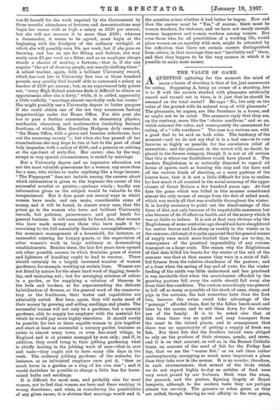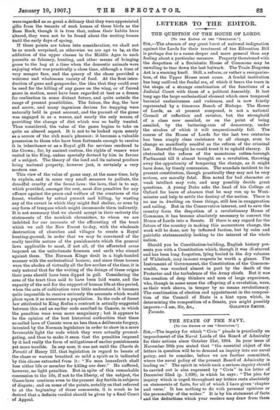THE VALUE OF GAME.
AQUESTION agitating for the moment the mind of many a lessor of shooting is that of his just assessment for rating. Supposing. A, being an owner of a shooting, lets it to B with the coverts stocked with pheasants artificially reared and turned out in them, is it just that be should be assessed on the total rental? He says " No, but only on the value of the ground with its natural crop of wild pheasants." The pheasants, he argues, are like furniture in a house, and so ought not to be rated. The assessors reply that they are, on the contrary, more like the "choice coniferae," and so on, which enhance the value, and consequently the assessment for rating, of a " villa residence." The case is a curious one, with a good deal to be said on both sides. The tendency of the moment—and we do not say that it is a bad one—is to rate luxuries as highly as possible for the correlative relief of necessities ; and the pheasant in the covert will, no doubt, be placed in the former category, though it is not at all certain that this is where our forefathers would have placed it. The modern Englishman is so naturally disposed to regard all forms of sports, such as hunting the stag and the hare and all the various kinds of shooting, as a mere pastime of the leisure hour, that it is not a little difficult for him to realise for how much it all counted in the social economy of the upper classes of Great. Britain a few hundred years ago. At that date the game which was killed in this manner constituted almost the only means of escape from the diet of salted meat, which was nearly all that was available throughout the winter. It is hardly necessary to point out the disadvantage of this form of diet, not only because of its unpalatable sameness, but also because of its ill effect on health and of the scurvy which it was so liable to induce. It is not at first very obvious why the Englishman of some centuries ago shouldnot have slaughtered his native beeves and his sheep as readily in the winter as in the summer, although it is quite apparent that his general means of supply were much more limited than they are to-day,,in, consequence of the practical impossibility of any oversew transport on a large scale. The reason why the Englishman of that date killed his beasts for the winter at the end of the summer was that at that season they were in a state of fall- fed fatness from the relative abundance of the pasture; and at a time when the saving of hay and of roots for the winter feeding of the cattle was little understood and less practised it was inevitable that when the nourishment afforded by the growing pasture fell away the cattle should fall away also from their fine condition. The custom accordingly was general to kill off as many as possible of the stock of oxen, sheep, and pigs in the autumn, the last somewhat later than the first two, because the swine could take advantage of the " pannage" afforded them, first by the fallen beech-mast and later by the acorns, and to salt them down for the winter use of the family. It is to be noted also that at this time them was no quick and easy transport from the coast to the inland places, and in consequence that there was no opportunity of getting a supply of fresh sea fish.. For their fish diet the dwellers inland were obliged to rely on the produce of their streams, ponds, and stews, and it is on that account, as well as, in the Roman Catholic times, on account of the need of fish for the Friday fast day, that we see the "coarse fish," as we call them rather contemptuously, occupying so much more important a place than they take now in the menus. It is no wonder, therefore, in such circumstances, that several of the birds which we do not regard highly to-day as articles of food were very much prized' by our forbears. Such were the swan, the peacock, and the peahen, figuring largely at Royal banquets, although to the modern taste they are perhaps almost too savoury. The gannets or solan geese, us they are called, though bearing no real affinity to the true geese,
were regarded as so great a delicacy that they were appreciated, gifts from the tenants of such homes of these birds as the Buie Rock, though it is true that, unless their habits have altered, they were not to be found about the nesting homes tntil the early days of spring.
If these points are taken into consideration, we shall not be so much surprised, as otherwise we are apt to he, at the addiction of the upper classes in the Middle Ages to such pursuits as falconry, hunting, and other means of bringing game to the bag at a time when the domestic animals were enjoying what was practically a close time, although a time of very meagre fare, and the quarry of the chase provided a welcome and wholesome .variety of food. At the first intro- duction of guns and gunpowder, the idea that they could ever be used for the killing of any game on the wing, or of furred game in motion, must have been regarded at best as a dream for realisation in some distant future, and quite outside the range of present possibilities. The falcon, the dog, the bow and arrow, and many ingenious devices for, trapping were naturally held in great account, and the pursuit of the game was engaged in as a means, and nearly the only means, of providing the change of diet which was so badly wanted. Thus considered, the value of the game begins to take on quite an altered aspect. It is not to be looked upon merely as a source of the rich man's pleasure: it becomes a valuable possession to those who have been fortunate enough to receive it in inheritance or as a Royal gift for services rendered to the Crown; for, by ancient custom, the rights of venery were vested in the King, unless specially devised by him in favour of a subject. The theory of the land and its natural produce being national property, . however just, is certainly a very modern one.
This view of the value of game may, at the same time, help to explain, and in some very small measure to palliate, the dreadful cruelty of the forest laws : the laws, that is to say, which provided, amongst the rest, most dire penalties for any offence against the peace and welfare of the creatures of the forest, whether by actual pursuit and killing, by wasting any of the covert in which they might find shelter, or even by any form of trespass which might incommode them indirectly. It is not necessary that we should accept in their entirety the statements of the monkish chroniclers, to whom we are indebted for our accounts of the afforesting of the tract which we call the New Forest to-day, with the wholesale destruction of churches and villages to create a Royal hunting-ground, in order that we may be convinced of the really terrible nature of the punishments which the general laws applicable to most, if not all, of the afforested areas imposed on the unfortunate freemen and serfs who sinned against them. The Norman Kings dealt in a high-handed manner with the ecclesiastical houses; and since these houses were the abodes of virtually all the few scribes of the time, it is only natural that for the writing of the doings of these reigns their pens should have been dipped in gall. Considering the area of the tract thus said to have been laid waste, and the capacity of the soil for the support of human life at this period, when the arts of cultivation were little understood, it becomes quite impossible to receive seriously the accounts which would place upon it so numerous a population. In the code of forest law attributed to King Rufus a contrast is actually suggested between this and an earlier code ascribed to Canute, in which the penalties were even more sanguinary ; but it appears to be the opinion of the best historical authorities that these so-called laws of Canute were no less than a deliberate forgery, invented by the Norman legislators in order to show in a more favourable light the code which they were actually promul- gating, and thus to make it seem that the penalties imposed by it had really the form of mitigations of earlier punishments yet more terrible. In any case, it was not until the Charta de Forestd of Henry IIL that legislation in regard to beasts of the chase or warren breathed so mild a spirit as is indicated by this clause extracted from it: " No man henceforth shall lose either life or member for killing our deer." He suffered, however, no light penalties. But in spite of this remarkable concession to the life, if not to the liberty, of the subject, the Game-laws continue even to the present day fertile in subjects of dispute; and on some of the points, notably on that referred to at the beginning of these comments, it is much to be desired that a definite verdict should be given by a final Court of Appeal.







































 Previous page
Previous page